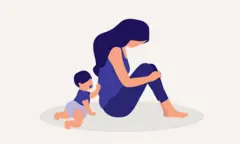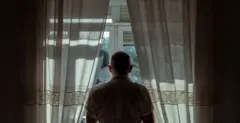- Author, Sumaya Nasr
- role, BBC Arabic News
International reports published in recent years show a decline in mental and mental health across different parts of the world among different age and gender groups, although young people are the largest group effect according to these reports.
The World Health Organization says that the mental state of people around the world is very worrying, and that the Covid-19 epidemic has worsened conditions such as depression and anxiety. The organisation’s latest reports estimate that around one billion people (more than one in eight) worldwide suffer from mental health problems, with depression and stress at the forefront of their lives. those problems. The World Health Organization notes that a lack of understanding of mental health conditions and the stigma surrounding them prevents people from recognizing these conditions in themselves or others, and from to seek help.
The State of the World Mental Health Report for 2023, which included 71 countries, indicated that the significant decline in mental health that the world saw between 2019 and 2021 is still continuing and shows no sign of abating.
The report also showed that young people under the age of 35 are significantly more likely to suffer from mental health problems compared to older generations. Some Arab countries ranked last in terms of mental health, including Iraq, Yemen, Tunisia, and Egypt.
Egyptian media reported an increase in mental and emotional problems and disorders in recent years. Among the reasons that the Egyptian writer and professor of sociology, Dr. Amal Radwan, told us about, are crises, shocks, and difficult world events such as the Covid-19 epidemic and wars “The disease is The Corona epidemic has had a huge impact on people’s mental health, especially young people… as well as unusual family and education problems… and the negative impact of websites.” “Social communication affects mental and emotional health.. economic conditions.”
Regarding the reasons why young people are more vulnerable to mental health problems, Dr. Amal says that this is due to “their incomplete psychological and cognitive maturity, as well as their living conditions, non- family stability, discrimination and neglect, or the lack of support. and support, as well as their fear of the future under the difficult economic conditions.”
According to the World Health Organization, Egypt faces several challenges in the field of psychiatric services. The group points out that most of the resources are allocated to a small number of large psychiatric hospitals, but the number of beds available for patients is still not enough for emergency care. provided within the hospital, especially since patients occupy 60 percent of the beds. for long periods of time.
There are also other challenges that some Egyptians who have been exposed to mental and mental health problems told us.

“You look good, so why the medicine? “
Lamia, a 34-year-old physical therapist, suffers from pregnancy-related depression. She has also suffered from anxiety for years when she is under a lot of life stress or visiting crowded places. population
She says: “Sometimes I fight this feeling and try to carry on with my life normally, and sometimes it affects my daily life and reduces my productivity .”
Lamia says she was “lucky” to have found a doctor who knows the latest trends in psychiatry, who listens to her and accommodates her during treatment sessions without rushing her, and who only prescribes medicine if it is absolutely necessary. e.
“I’ve been going to him for six years, and just a year ago he gave me medicine.
But Lamia believes that most patients in Egypt only go to the doctor when their condition improves, and then these methods may not be useful, due to “a lack of awareness about the problems psychological and mental that they face. “
In addition to the lack of awareness, Lamia says that weak financial capabilities and lack of acceptance of the idea prevent them from seeking medical help in many cases. “The previous generation find it stigmatized, or see it mocked even in work situations, I hear comments like: ‘You look good, so why the medicine?’ “
Therefore, Lamia made the decision that “the only safe circle I can talk about my problems with is my husband and my close friends. “

“Recovering my brother was like a dead man coming back to life. “
The suffering that comes from mental health illnesses is not limited to the patient, but it also extends to those close to him.
This is exactly what happened to the gynecologist, Samia, who found herself having to care for her brother and convince him to go to a special hospital, without much family or community support.
“My brother Hossam, who is almost forty, started having problems when he was in his late twenties. and he seemed to be talking to someone who wasn’t there.”
Samia says that because of her medical background, she began to suspect that he had a mental illness, but she refused “because of the social stigma … people and people from rich backgrounds.”
“The people around me are mostly doctors, well educated and rich, but still I don’t talk about my brother’s problem with them for fear of social stigma I am surprised when a doctor writes in a group on social media the members are all doctors that he has someone who suffers from mental or mental problems and wants to treat him. ”
After “two years of efforts and coercion,” her brother was admitted to a special hospital, received treatment, and greatly improved after controlling his symptoms.
“Some people thought he was jealous and that he had to go to the clergy, but I refused because I knew he needed medical treatment. “
Another problem Samia faced was finding a good medical facility.
“Not all hospitals have a good reputation.
The lack of support for the patient’s partners also makes it difficult to function. “After a while you get tired, and you have to be there for the patient’s companions.”
“Personally, I only received support and help from one member of my family. The matter is not easy, neither for the patient nor for those around him. It is also difficult to deal with after treatment and it is necessary to be aware and accept it.”

“Depression is my only friend.”
Nader, 49, suffered from post-traumatic stress disorder in 2011. He says his family and close friends listened with sympathy and interacted with him at first, but after a while they became distracted with their lives.
“Then these people start judging you. but I felt a gap between me and them. Gradually, I lost the desire to speak.” They would say things like this to me: ‘Why don’t you pray? I began to feel alienated from them, and I went into solitude for long days without wanting to see anyone .”
Dr. Amal Radwan says, “Mental illness is confusion confused by a weak faith that ignores the fact that mental illness, like any physical disease, requires treatment and is not It has nothing to do with the strength or weakness of faith, which puts the patient under bad treatment. stress that leads to the deterioration of his condition.
With the lack of understanding from the people around Nader about his condition and feelings, his isolation increased.
He says: “I feel that no one understands me despite the pain and I’m getting used to this pain.
Nader’s condition progressed to the point where it was no longer useful to get out of bed or take care of himself, and he began to feel that he could not continue.
“I spent a whole year researching medicines and drugs that I could take (to commit suicide) without being found after my death, so that my children would not be stigmatized that their father died as an unbeliever. “
Nader tried to commit suicide twice. After the first time, he was blamed and described as selfish, and his wife asked for a divorce because of the pressure she was under as a result of that effort. “I responded despite my love for her,” he says. “I had a breakdown, tried to commit suicide again, and continued to feel depressed.”
Nader says he rented an apartment in the basement of the building, where he spent two years, leaving only to work enough to support his children for a while, and the then return to the unit again.
“I knew I should go to a psychologist, but I was afraid of this step and I was afraid that someone would judge me.”
Nader finally took this step in 2020, and like Lamia, he says he was “lucky” because he found a skilled doctor “who is willing to listen to me, and doesn’t mind me call at any time if I need a special doctor. session.”
Nader’s health condition has improved and he no longer needs regular sessions.
He emphasizes the importance of being aware of going to a psychologist, and says that, despite its infrequency, it “is accessible to everyone.” , even though my middle son, who is 15 years old, had recently asked me to visit a psychiatrist. It is clear that the rate of spread of consciousness is faster and easier for new generations.
*The names of the people who shared their knowledge have been changed at their request.
2024-10-10 08:55:00
#Mental #mental #health #Egyptians #talk #lack #awareness #support #fear #stigma

